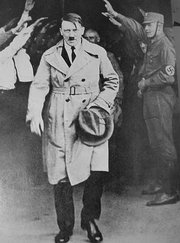|
|
The Führerprinzip, the German name for the leader principle, refers to a system with a hierarchy of leaders that resembled a military structure. This principle applied to civil society at large in Nazi Germany.
| Contents |
Philosophy
The philosophy of this system sees each organisation as a hierarchy of leaders, where every leader (Führer, in German) has absolute responsibility in his/her own area, and complete subordination. This idea paralleled the functionality of military organisations, which continue to use such a structure today. The notion behind the civil use of the Führerprinzip saw unquestioning obedience to superiors producing order and prosperity in which those deemed 'worthy' would share. Given the chaotic state of the Weimar Republic between 1919 and 1933, many Germans regarded this philosophy of 'cutting through red tape' as a welcome change to what they had endured earlier.
This principle became the law of the Nazi party and later transferred onto the whole German society. Appointed mayors replaced elected local governments. The Nazis suppressed associations and unions with elected leaders, putting in their place mandatory associations with appointed leaders. The authorities allowed private corporations to keep their internal organisation, but with a simple renaming from hierarchy to Führerprinzip. In practice, the selection of unsuitable candidates often led to micromanagement and commonly to an inability to formulate coherent policy. Albert Speer noted that many Nazi officials dreaded making decisions in Hitler's absence. Rules tended to become verbal rather than written; leaders with initiative who flouted regulations and carved out their own spheres of influence might receive praise and promotion rather than censure.
Application
During the post-war Nuremberg Trials, many defendants attempted to use the Führerprinzip as a means to evade responsibility for war crimes: "I only did what I was told".
Comparison with other doctrines
In 1999, United Kingdom's Prime Minister Tony Blair likened the Serbian régime of Slobodan Milosevic to Hitler's Germany and his Führerprinzip. [1] (http://www.unol.org/messages/5377.shtml)
See also
External links
- BBC historical article (http://www.bbc.co.uk/history/war/wwtwo/hitler_commander_01.shtml)
- Bearers of a Common Fate? (http://www.wernercohn.com/Paulus.html)
- The Political System of the Third Reich (http://mars.acnet.wnec.edu/~grempel/courses/germany/lectures/29nazipolitics.html)de:Führerprinzip

